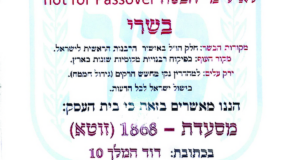With special venom reserved for Jews reasserting their claim to the land.
Ramallah, March 23 – Staff at an institution dedicated to displaying indigenous artifacts of the Arab people of this part of the Levant struggled again today to articulate the difference in tone the exhibits take toward two different periods in which a colonizing foreign entity swept through the land and imposed hegemony on its inhabitants, with periods prior to the seventh century and after the nineteenth portrayed in frightful terms, while those in between are characterized in neutral, benign, or glorious terms, a discrepancy that curators and docents have grappled with unsuccessfully since the venue opened to guests several years ago.
The Palestinian History Museum in the de facto Palestinian capital has long faced an uphill campaign to collect and present artifacts consistent with the premise of Palestinian Arab indigeneity. Spokesmen for the institution have at various times accused Zionists of destroying or fabricating evidence, only to become stymied in the face of Arab pronouncements from previous ages that assume as a matter of fact, for example, that Jews were sovereign here long before Arabs imposing Islam arrived in the first half of the eighth century CE. A prominent instance of the phenomenon involves a guide to the Haram al-Sharif – the compound housing the Dome of Rock and the Al-Aqsa Mosque – by the Islamic Waqf itself – stating the established fact that the site held both ancient Jewish temples.
“The Islamic expansion into Palestine brought peace and prosperity,” the staff and exhibit notes insist, with similar effusive treatment of Seljuk, Mameluk, Ottoman, and other brutal conquests by repressive rulers under the banner of Islam. “Byzantine corruption and repression caused untold suffering,” on the other hand, depicts a population in torment under regimes that followed anything but Islam, with special venom reserved for Jews reasserting their claim to the land.
Museum officials changed the subject when visitors asked, in the context of their insistence that Palestinians have lived in the land since long before Judaism existed, about the pride with which so many Palestinians boast of their Arabian Bedouin heritage and ancestry, their nomadic ancestors having migrated into the land in the last several centuries. “You misunderstand,” they argued, but preferred to point to shiny new artifacts rather than clarify the misunderstanding.
“Look, we just got this in,” they rushed to interject. “It’s a collection of arrowheads from the Seleucid campaign in the mid-second-century BCE.”
“Whom were they fighting?” asked a visitor.
“Next exhibit!” the docent yelled. “We really have to get through, we’re running out of time.”
Please support our work through Patreon.
Buy In The Biblical Sense: https://www.amazon.com/dp/B0B92QYWSL



